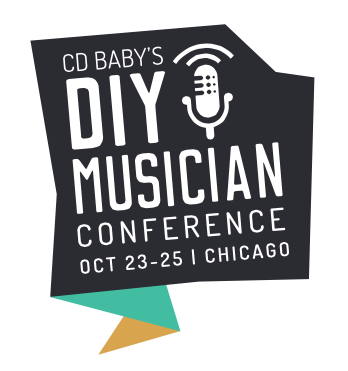Over 1,000 musicians from all across the globe, spanning every genre – from acoustic metal-rap to Zydeco pop covers – headed for Chicago to empower themselves with the knowledge handed down from leading music industry experts at CD Baby’s first ever artist-oriented DIY Musician Conference.
To say that CD Baby cultivated a great sense of community and camaraderie amongst conference attendees would be an understatement. Every independent artist who showed up showed their true colors and spirit. Many shed their roles back home as waiters and baristas, embraced their calling as musicians and artists, and supported one another in their newfound reverence to discover so many like-minded individuals on the same path. They finally found their tribe.
The conference was sponsored by Rumblefish, GigSalad, and Berklee Online, with additional support from SoundExchange and Shure. Attendees learned how to manage and promote their careers with panels and workshops on everything from curating their brand on YouTube and other social media channels and booking tours themselves to effective email marketing and fan growth.
Hypebot sat down with Patrick Griffin (Digital Promotions and Label Relations at CD Baby), Chris Robley (Marketing Coordinator at CD Baby), and J. Gibson (Head of Content Strategy at Rumblefish) to learn how independent artists can boost their careers by taking advantage of the growing digital landscape.
Couldn’t make it out this year? Here are some highlights all musicians can learn from.
1. Always have something to give.
Griffin: Always have something to give, even if it’s something as small as a business card, you know, t-shirts and CDs are awesome, too, but just have something that a person can walk away with that makes them remember you.
A band from Portland did earplug cases where they wrote, “For your weed” on them. I thought that was kind of funny. We work with this company called Merch.ly, and that’s their thing. [They] will source any item you want. I was talking to a friend of mine, and he was like, “What if we had screwdrivers, like cool screwdrivers that had our name on it?” I was like, let me talk to the guys at Merch.ly. He was like, “I can get you red ones for this amount.”
I’ve definitely seen a lot of weird stuff. Sunglasses are really popular. They work really well, which is kind of funny. I wouldn’t think so, but people seem to like it.
2. Define and hone your social persona.
Robley: I get a sense that it’s sort of important for a musician to say, “Am I going to be a YouTuber or am I going to be a musician that has a presence on YouTube?” They seem like different things to me and I don’t know exactly how to define it but effort. Effort and also the kind of personality. It seems like there’s a certain kind of personality that works. Gregarious and a little bit wacky.
3. Roll with the punches as they come.
Griffin: You have to be nimble. Be nimble, be flexible. Be ready for something to go wrong and then pivot when it does. Definitely in terms of, and that’s something I’ve learned from working at CD Baby, there are things, mistakes that happen. Your album’s supposed to come out today and iTunes is down. Or CD Baby’s down. Amazon’s back end system messed up and they didn’t post your album today.
There was one artist, her album wasn’t up on Amazon, and she tweeted something to the extent of, “Sorry about Amazon, I’m working with them about something really special that may happen, stay tuned.” Totally made up, but it was that interaction with her fans that made it seem like, “Oh, it’s not a mistake her album’s not on Amazon. It’s a bonus special thing because I’m maybe planning something with them.” A little bit of positive spin can really help.
4. Leverage your back catalog.
Robley: One thing that we’ve been fascinated with for the past few year at CD Baby is the fact that in the old music industry there was this limited shelf life and limited window for success and for a song artist to do something. Now that’s completely gone.
That guy, Perron Lamb, I’ve talked about three times. His song wasn’t super old, I think it was already a year and a half old when he got all this traction. That’s happening more and more. We’ll have artists who will have songs from years ago that they’ve long forgotten about, but it’s in our sync catalog and it’ll get licensed somewhere for $40,000 for a Coke commercial or something.
The idea of concentrating on your back catalog and not ignoring it makes you realize that it’s now more an asset than it ever was before because everything is searchable. The music is always going to be new to someone. Don’t neglect it. Don’t neglect the old shit.


